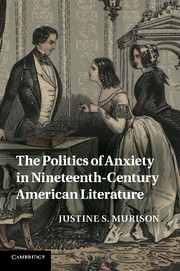The Politics of Anxiety in Nineteenth-Century American Literature
Part of Cambridge Studies in American Literature and Culture
- Author: Justine S. Murison, University of Illinois, Urbana-Champaign
- Date Published: December 2013
- availability: Available
- format: Paperback
- isbn: 9781107694149
Paperback
Other available formats:
Hardback, eBook
Looking for an inspection copy?
This title is not currently available for inspection. However, if you are interested in the title for your course we can consider offering an inspection copy. To register your interest please contact [email protected] providing details of the course you are teaching.
-
For much of the nineteenth century, the nervous system was a medical mystery, inspiring scientific studies and exciting great public interest. Because of this widespread fascination, the nerves came to explain the means by which mind and body related to each other. By the 1830s, the nervous system helped Americans express the consequences on the body, and for society, of major historical changes. Literary writers, including Nathaniel Hawthorne and Harriet Beecher Stowe, used the nerves as a metaphor to re-imagine the role of the self amidst political, social and religious tumults, including debates about slavery and the revivals of the Second Great Awakening. Representing the 'romance' of the nervous system and its cultural impact thoughtfully and, at times, critically, the fictional experiments of this century helped construct and explore a neurological vision of the body and mind. Murison explains the impact of neurological medicine on nineteenth-century literature and culture.
Read more- Explores the relation of literature and science in the nineteenth century, historically and methodologically
- Explains the science of the nervous system as it was understood in the nineteenth-century United States
- Focuses on the works of Poe and Beecher Stowe alongside lesser-known authors
Customer reviews
Not yet reviewed
Be the first to review
Review was not posted due to profanity
×Product details
- Date Published: December 2013
- format: Paperback
- isbn: 9781107694149
- length: 230 pages
- dimensions: 229 x 152 x 12 mm
- weight: 0.31kg
- availability: Available
Table of Contents
Introduction
1. A bond-slave to the mind: sympathy and hypochondria in Robert Montgomery Bird's Sheppard Lee
2. Frogs, dogs, and mobs: reflex and democracy in Edgar Allan Poe's satires
3. Invasions of privacy: clairvoyance and Utopian failure in Antebellum romance
4. 'All that is enthusiastic': revival and reform in Harriet Beecher Stowe's Dred
5. Cui bono?: Spiritualism and empiricism from the Civil War to American nervousness
Epilogue: the confidences of anxiety.
Sorry, this resource is locked
Please register or sign in to request access. If you are having problems accessing these resources please email [email protected]
Register Sign in» Proceed
You are now leaving the Cambridge University Press website. Your eBook purchase and download will be completed by our partner www.ebooks.com. Please see the permission section of the www.ebooks.com catalogue page for details of the print & copy limits on our eBooks.
Continue ×Are you sure you want to delete your account?
This cannot be undone.
Thank you for your feedback which will help us improve our service.
If you requested a response, we will make sure to get back to you shortly.
×








